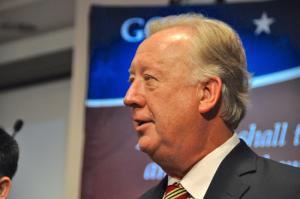An effort aimed at empowering elected sheriffs to exercise their constitutional powers in Delaware and nationwide drew a noisy crowd of more than 250 people.
Richard Mack, retired sheriff of Graham County, Ariz., told a Sussex County audience that state and county officials are out to prevent Sussex Sheriff Jeff Christopher from keeping his oath to protect, serve and obey the U.S. Constitution and answer to the people who elected him. “All elected officials are bound by oath to support the Constitution,” Mack said.
“This is the most critical time in American history since the Civil War,” Mack said. “This is the generation that decides if we maintain our constitutional republic or fall to the temptation to [be] a socialist government.”
“We have to realize that the problem in Delaware is the problem everywhere,” said the Rev. David Whitney, senior instructor a the Institute for the Constitution, sponsors of the April 6 Sheriff and Citizen Summit at Delaware Technical and Community College.
The day-long seminar featured six speakers focusing on the constitutional role of the sheriff.
The reason for the Georgetown location can be tied to the highly publicized lawsuit Christopher filed against Sussex County seeking to establish is right to make arrests. Although a judge ruled against the sheriff, Christopher says he will appeal the ruling to the Delaware Supreme Court.
House Bill 325, signed into law in June 2012, clarified Delaware law specifying sheriffs and deputies do not have arrest powers. Christopher simultaneously filed a lawsuit against county officials, asking the court to rule that as the chief law enforcement officer in Sussex County he would be authorized to carry out law-enforcement duties, including traffic stops and arrests, transporting prisoners and providing crowd control at events.
On March 19, Delaware Superior Court Judge T. Henley Graves ruled sheriffs in Delaware do not have the power to make arrests and cannot act as police officers.
Graves reviewed the history of the role of the sheriff, writing, "The central question is: Does the Office of the Sheriff inherently possess law enforcement authority because he is a conservator of the peace? The answer is no."
Sussex County defines the Sussex County Sheriff's job as administering foreclosure sales and delivering court papers.
Mack: Sheriffs answer to the people
Co-founder of the institute Michael Peroutka introduced Christopher as a true American hero, followed by a long standing ovation from the crowd.
Mack said the clear distinction between local sheriffs and state police is that elected sheriffs answer to the people while state police answer to the state bureaucracy.
He said legislators were able to do away with the Sheriff's Office in Connecticut. “They are trying to do the same in Delaware,” Mack said. “The state is not above the voters of Sussex County. Judges all over the country have endorsed that. Law and history show that the Sussex Sheriff is the chief law enforcement officer and the conservator of the peace in the county.”
Mack, who won a federal lawsuit in the U.S. Supreme Court in 1997 challenging some regulations in the Brady Bill, said the ruling clearly pointed out that sheriffs are not subject to outside interference. Under the bill, sheriffs were obligated to conduct background checks on gun purchasers and keep files on gun owners. Mack said his biggest objection was that anyone who failed to comply would be arrested, including sheriffs and deputies.
The 5-4 decision found that the federal government could not compel states or state officers to administer a federal regulatory program.
Mack said the federal government is not the supreme power that dictates what states and counties must do. He said states have sovereign rights while the federal government has limited and discreet powers.
“The D.C. bureaucracy wants you to believe that their policies supersede your rights and the Bill of Rights; the states and counties have gone along,” Mack said.
Attorney Derek Howell said it's the sheriff's duty to preserve the peace, enforce laws and arrest and commit felons to jail and to carry out the mandates, orders and directions of the court. He said a sheriff is also obligated to defend the country against all enemies to keep the peace, and he may command all of the people in the county over the age of 15 to join a posse to assist him. Howell is director of operations for the institute.
According to Howell, the state legislature can impose additional duties on the sheriff as a constitutional officer, but the legislature cannot restrict or reduce the sheriff's powers as allowed by the constitution.
“The sheriff is the chief law enforcement officer in the county. His jurisdiction is co-extensive within the county including all municipalities,” Howell said.
Posse training sessions are scheduled
Constitutional training sessions for deputies, posses and citizens in support of the sheriff have been scheduled from 7 to 9 p.m. on Mondays, April 22 to July 15, in the Sussex County Sheriff's Office.
Christopher is actively recruiting posse members, which he defines in a brochure as “the entire population above the age of 15, which a sheriff may summon to his assistance in certain cases; as to aid him in keeping the peace, in pursuing and arresting felons.”
“It seems that our government has turned on us. Leaders of government today appear to have forgotten that we are the people who put them in office to protect us from the bad guys,” Christopher said. “Anyone who leads the charge to take away our liberties or sits idly by to allow it to happen is the bad guy.”
Christopher said that doesn't mean people should take up arms and go after the bad guys. “But, you have a role in protecting and ensuring the safety of this country, your family and yourself. The sheriff was created to ensure such a task,” he said.
Although the training sessions have been planned, Sussex County administration has not been notified. County spokesman said after-hours use of county facilities and meeting rooms must first be approved by administration, said county spokesman Chip Guy. “We have not received a request from the Sheriff's Office or any other organization. We'll have to look into this some more,” Guy said.
Institute formed by Maryland law firm
Institute on the Constitution is an educational effort sponsored by the law office of Peroutka and Peroutka in Pasadena, Md. According to the website, the goal of the institute is to help people understand and appreciate their history and heritage by reacquainting them with the worldview and vision of the founding fathers in an effort to restore the constitutional republic.
“We believe that by understanding the way in which the framers of our constitutional republic viewed their relationship to God, to other sovereign states, to their families and to each other, we can gain valuable and practical insight into the foundational principles of America,” the website states.



























































